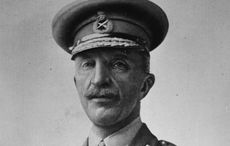| Eileen Smith working the folks at the CARA Club with her light exercise program. |
| Bridie with Tina enjoying the Karoke at the IPC coffee morning in Dorchester. |
| Mary McFadden steppin' it out with Kevin O'Sullivan at the IPC Coffee morning. |
Cara Club
A lovely afternoon was had by all at the Cara Club this week with Eileen Smith, Wellness Professional, getting everyone to move and stretch their limbs at her light exercise program. An enjoyable half hour as always guaranteed to get the blood flowing and muscles working followed by the sing-along with Kevin O’Sullivan.
Dorchester Coffee Morning
It was a very lively coffee morning at the IPC on Wednesday. Roars of laughter could be heard throughout the building as Kevin O’Sullivan showed a few funny short video clips which ranged from a two year old boy dancing to Elvis to two dogs eating dinner at a table, knives and forks included! We enjoyed karaoke led by Kevin for the rest of the morning.
Last week, the Senior Notes featured an article about the American Institute for Economic Research free booklet called ‘If Something Should Happen: How to Organize Your Financial and Legal Affairs.’ The number to call to order your free copy is 1-888-528-1216 rather than a 1-800 number as stated in the article.
Too old to travel? Not at all!
In the vast majority of cases anyone can travel, it just requires some suitable common sense and planning to ensure that the individual is not taking on more than is sensible. With good doctor/patient interaction, many of the potential pitfalls can be overcome and the older traveler can look forward to a well deserved escape from those overactive grandchildren.
Medical checks: Before actually booking the holiday and paying the deposit, it is wise for the older traveler to visit their doctor and discuss their plans. At that stage the GP can assess the individual's general health and see how this may possibly interfere with the proposed trip. The final decision in almost every case must be up to the traveler but they at least should listen to what the doctor thinks before making any final decision.
Where to, when and why: Knowing the location (either from an informed travel agent or a personal contact) is worth its weight in gold. For the traveler planning a 'standard' holiday to a warmer climate might involve issues like the duration of the flight, the expected temperature/humidity, the local level of pollution, the closeness of shopping facilities, and the number of stairs to the apartment/room. These are all features which can make or break a trip abroad.
Group travel: For those older travelers planning to take part in a group trip it is essential that they know something of their travelling companions. If the average group age is significantly less than their own they may feel pressurized to over-do their activities with very unpleasant consequences.
Travel insurance: Travelers in the older age bracket will more likely have an underlying health condition which could be exacerbated by long-haul travel. In these cases it is essential to know that their insurance policy will cover local medical care (including hospitalization) and also repatriation. The traveler should discuss their specific requirements with a specialized travel insurance broker. Honesty in declaration is essential and the medical practitioner should not be tempted to skimp on the details of previous medical history as this may have serious financial consequences for the traveler should their policy be called into action.
Carrying medications: The older traveler often will be on prescribed medications. Providing these are clearly marked, there should be no difficulty at customs (if traveling out of the country). Occasionally, for some of the more obscure medications, it may be helpful to have a doctors letter confirming that the medications are essential and required for the individual traveler's personal health. Correct storage facilities may be important (insulin, various eye ointments etc) and the individual should always have a sufficient supply for their entire stay. It may be wise to split their supply with a travelling companion so that if one lot gets misplaced the remainder will at least keep them going while replacements are sought. A small first aid kit containing antiseptic cream, corn plasters, support bandage etc may be a useful addition especially for those who will be walking a fair deal.
Special circumstances: Arthritis and back pain can be made worse through either inactivity while undertaking a long-haul flight or from uncomfortable seating arrangements at airports or on planes. Regular movement is important and the traveler should be encouraged to use the compression stockings to reduce the risk of deep venous thrombosis.
Seeing: Eyesight tends to fail with advancing years and many older people would be lost without their glasses. Travelling with only one pair (and without the prescription) is foolhardy.
Source: Extracts from article on www.seniortimes.ie
Email me at catherinemoloney@ipcboston.org or call 617 265 5300 x 12




Comments